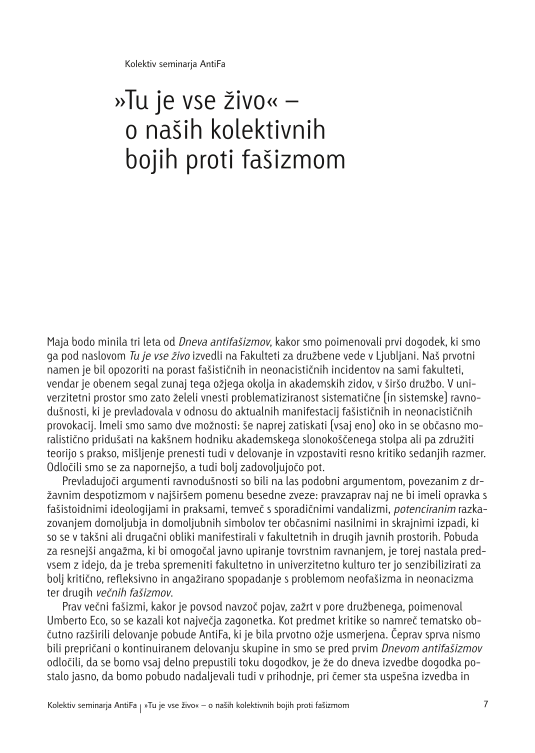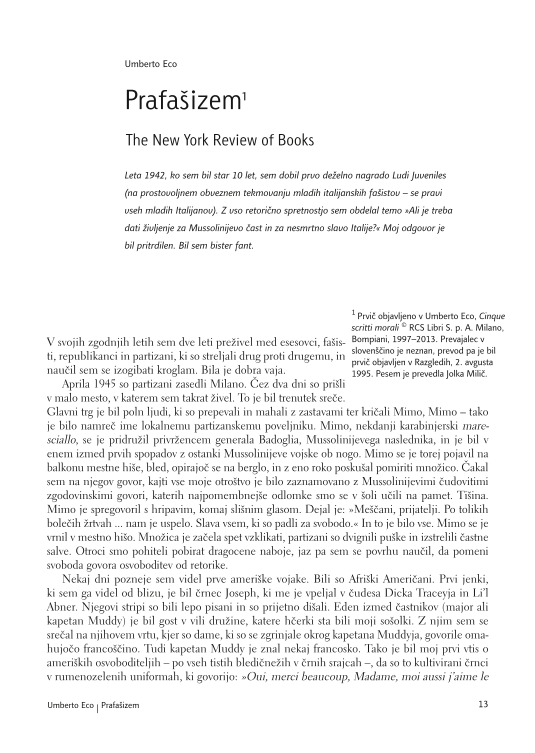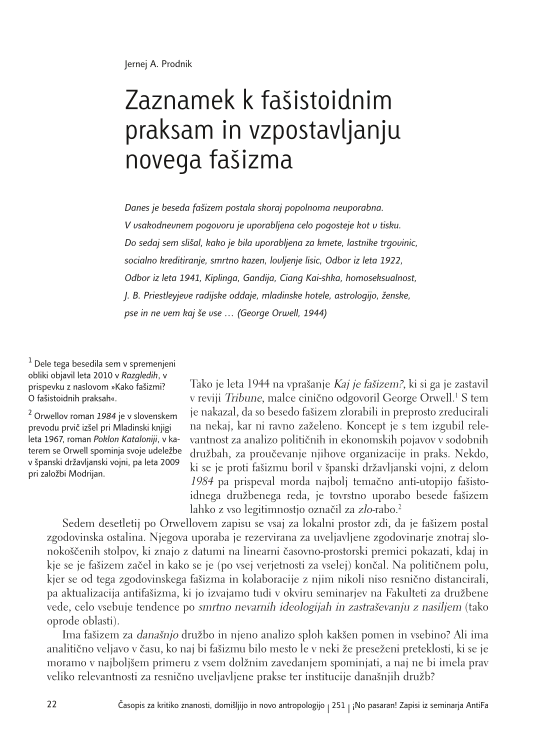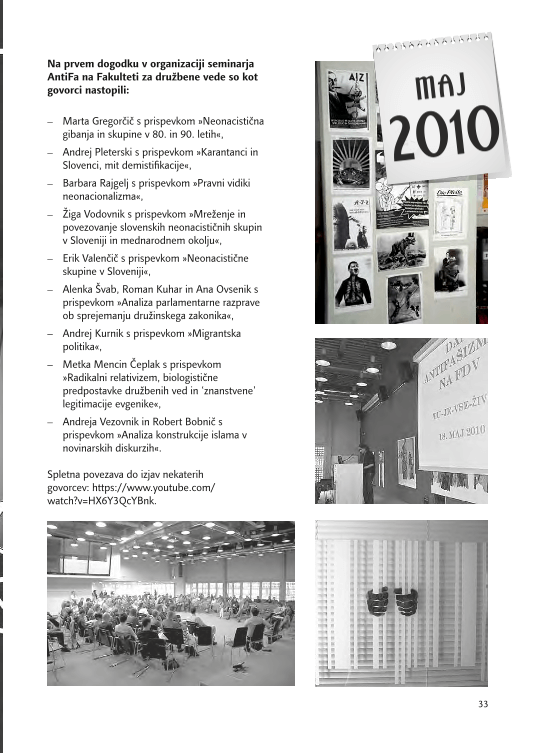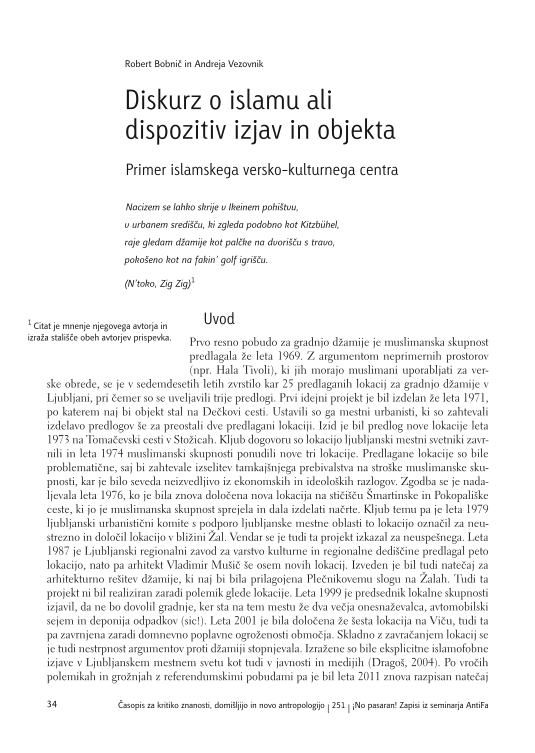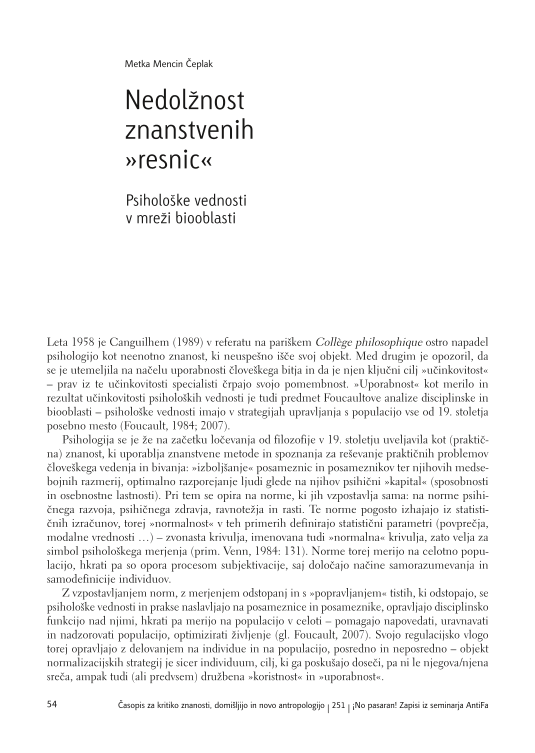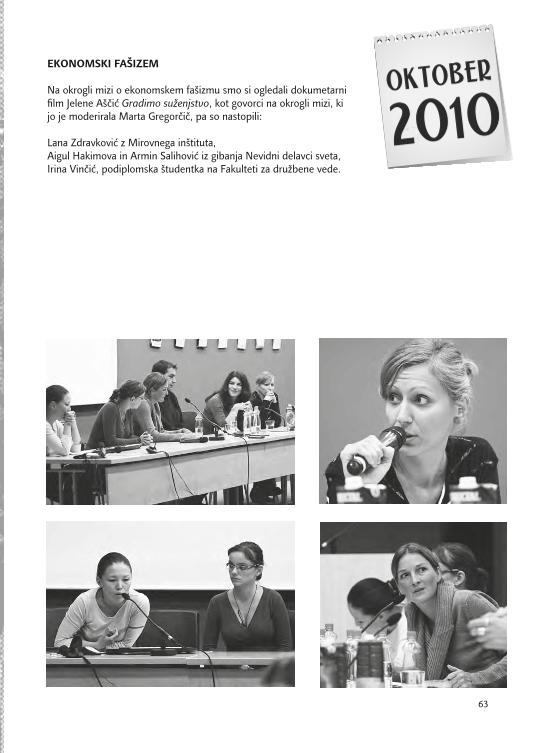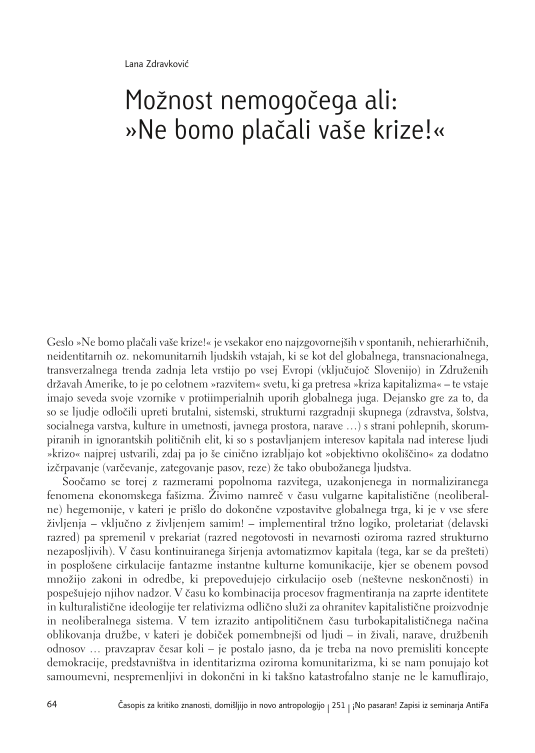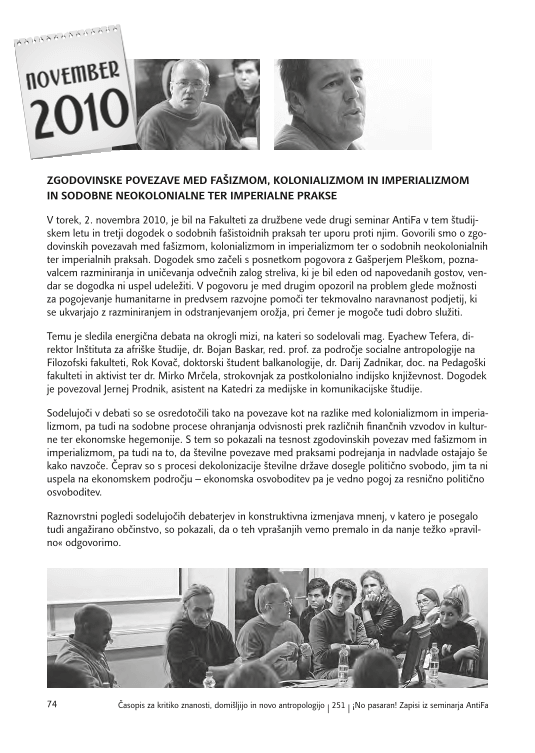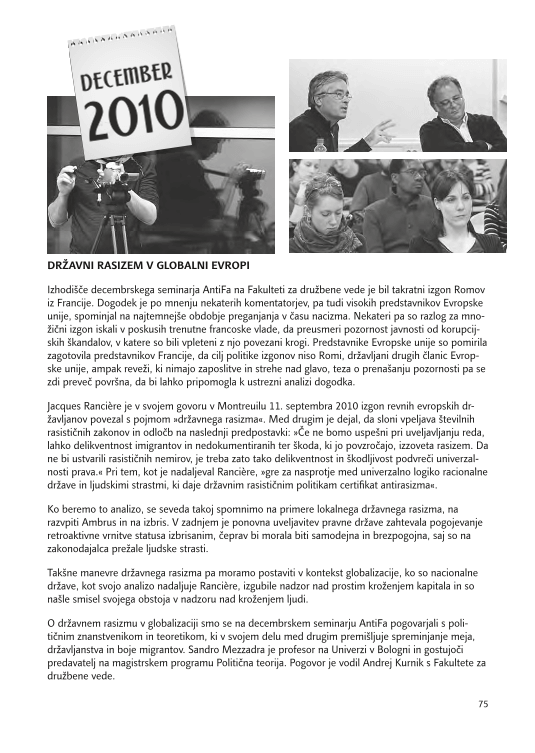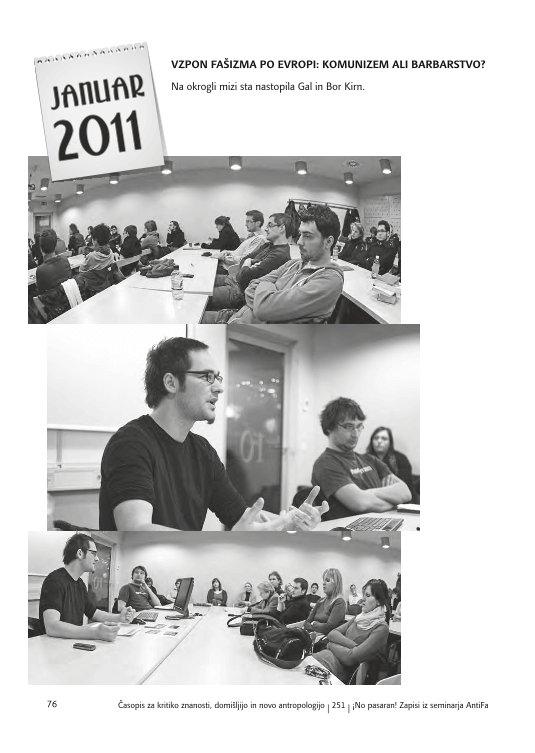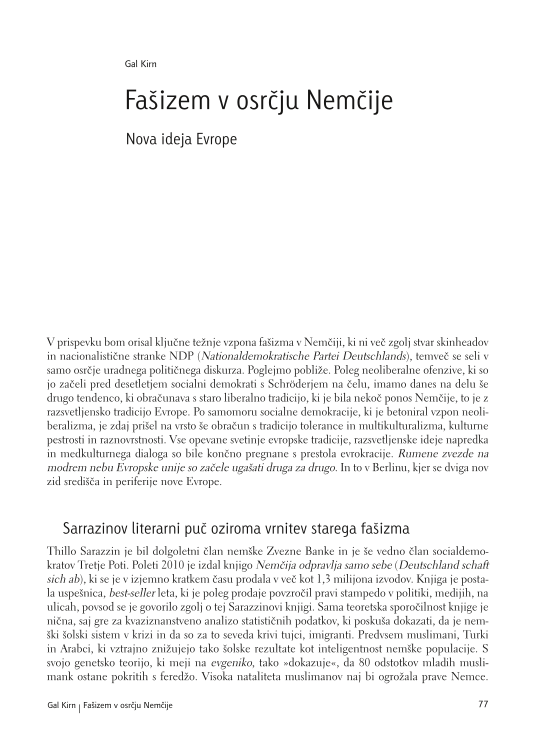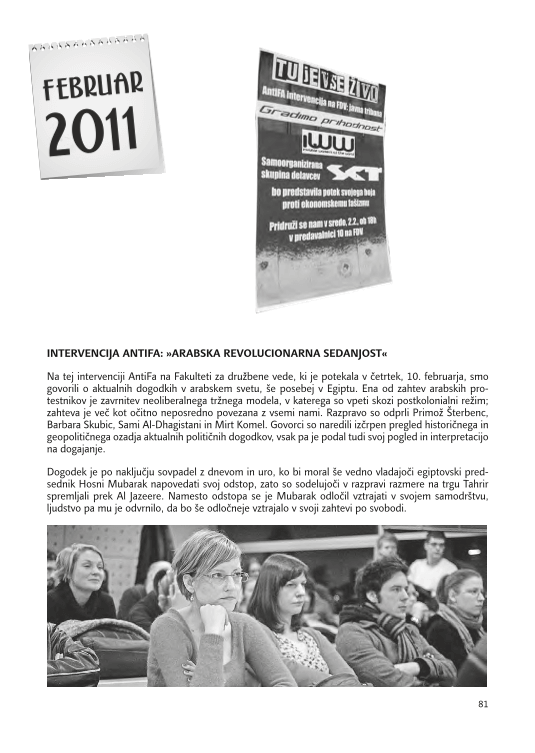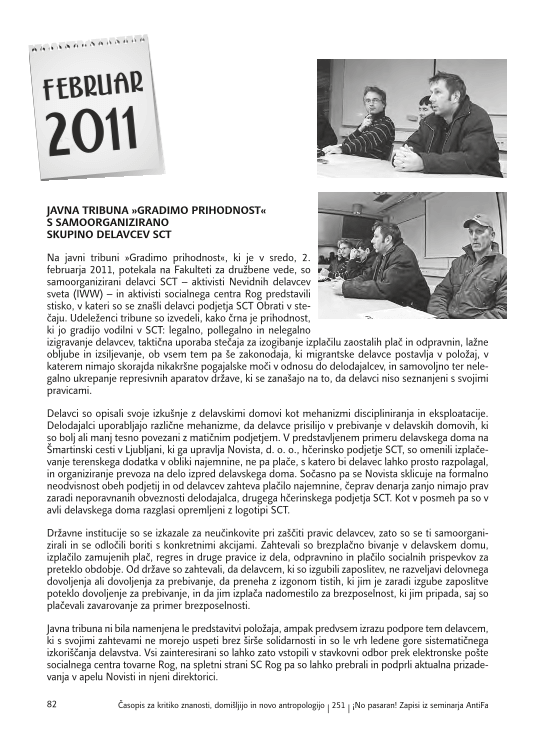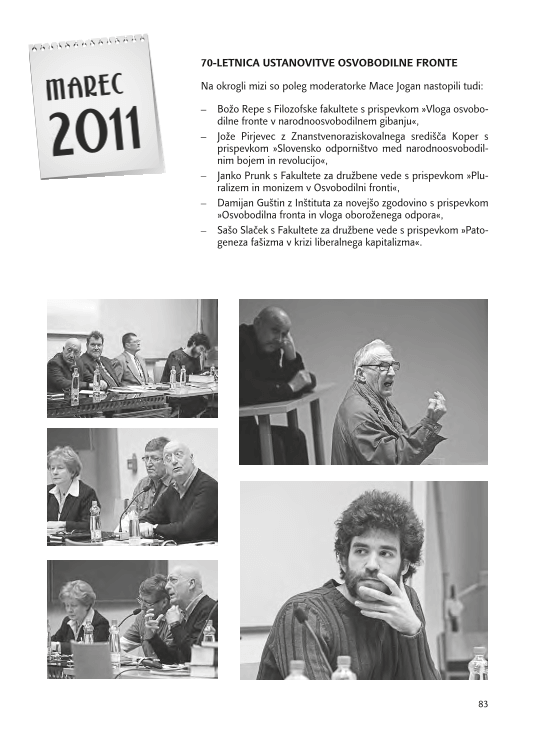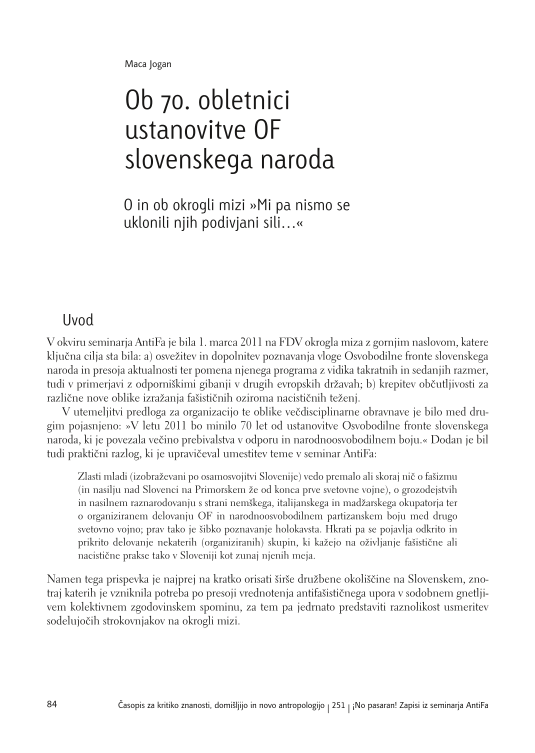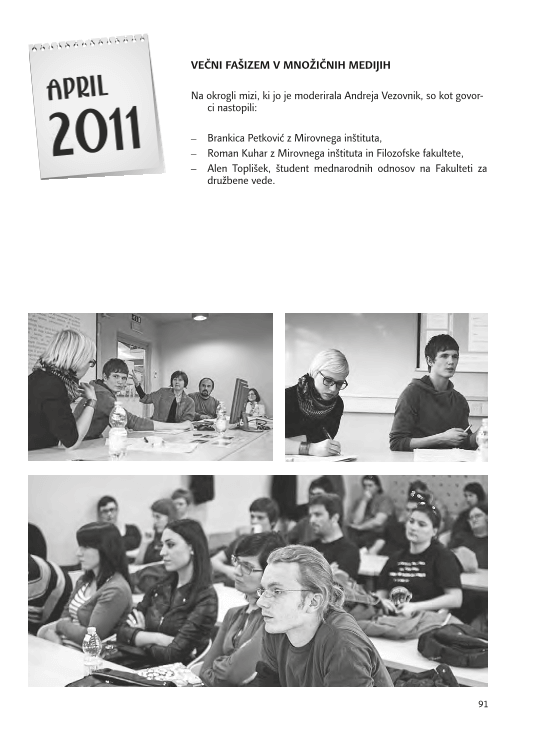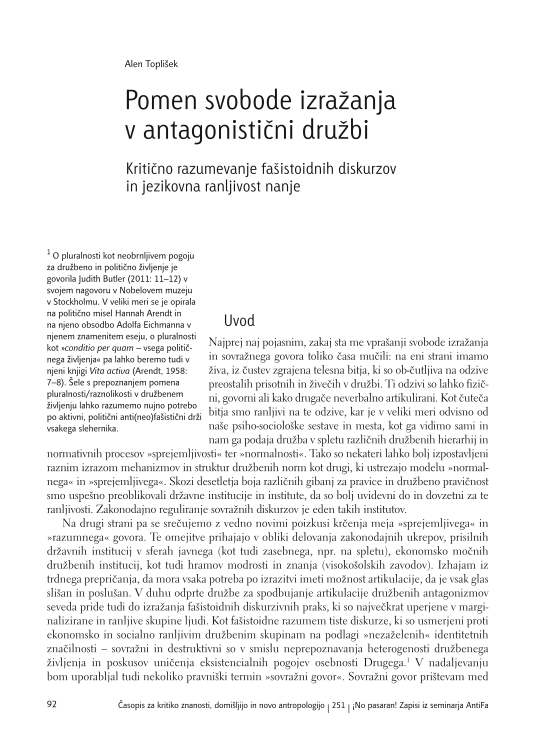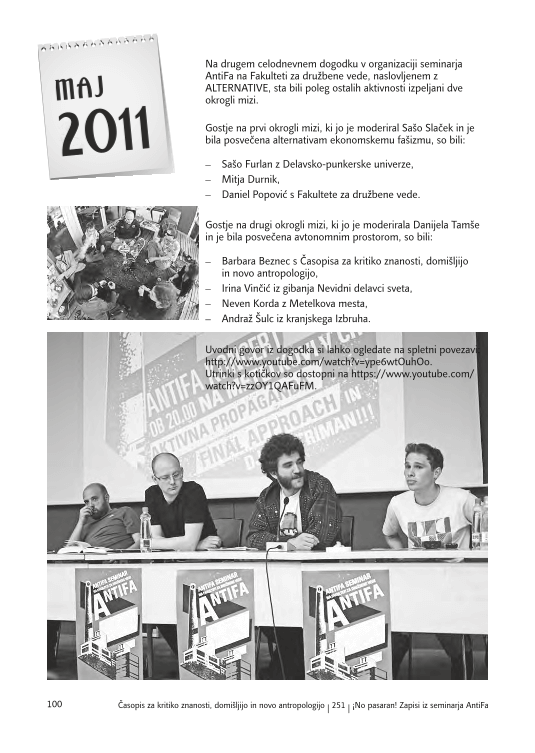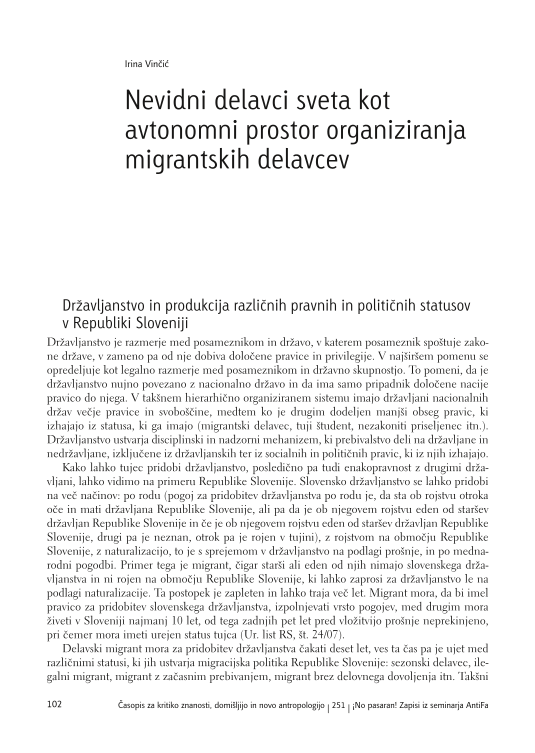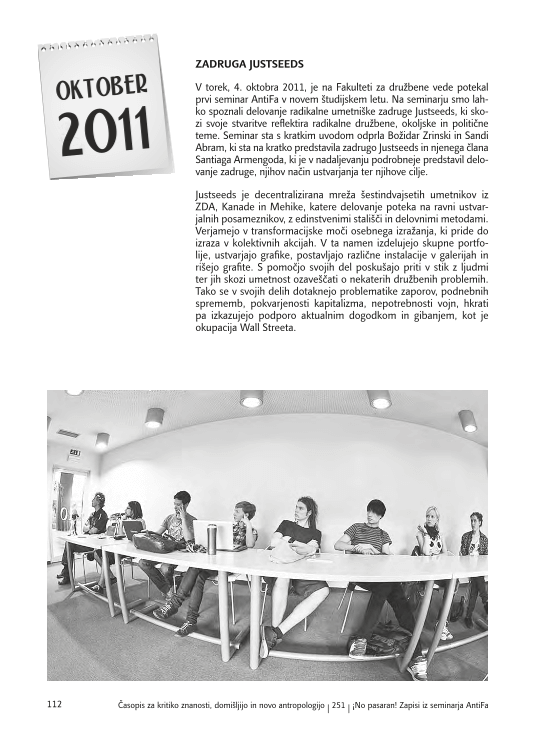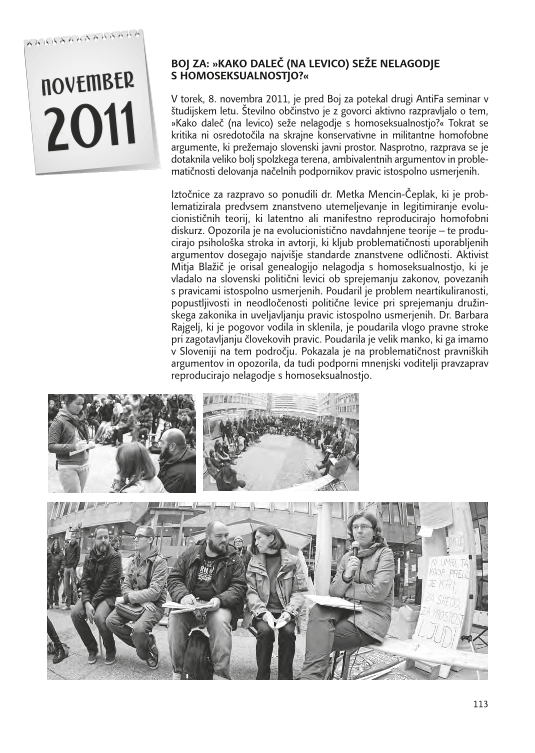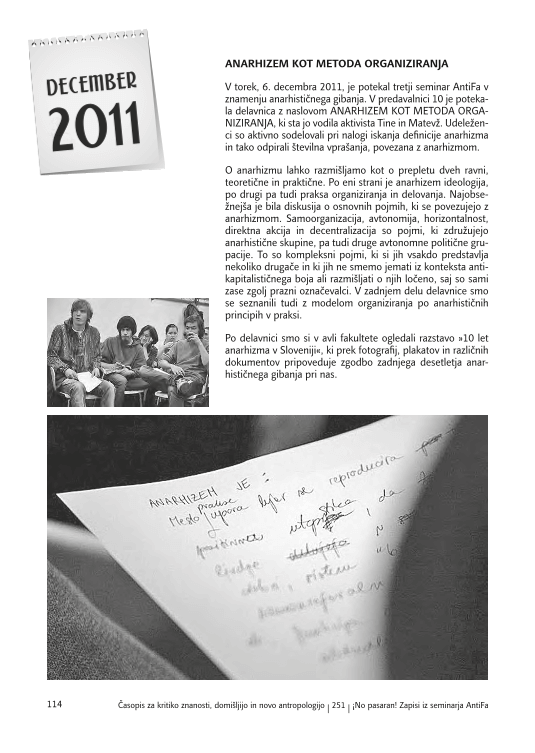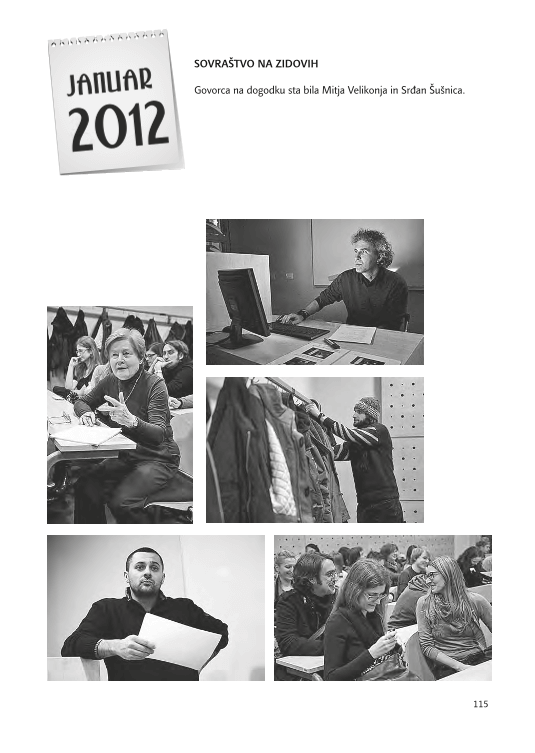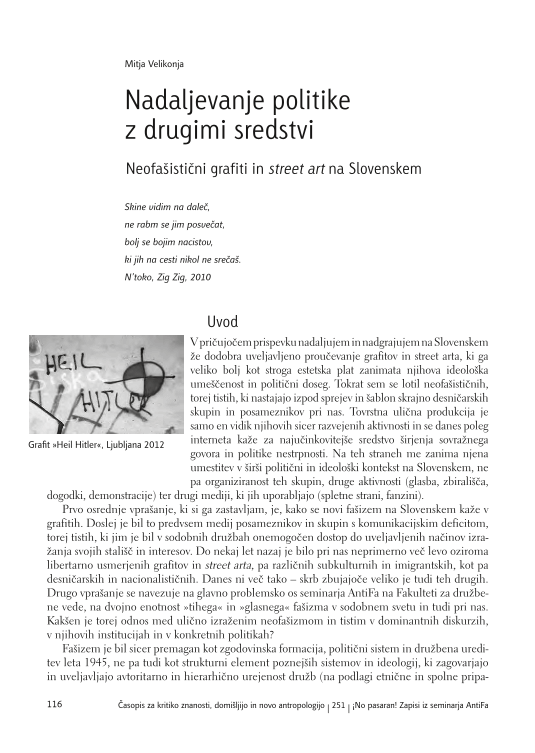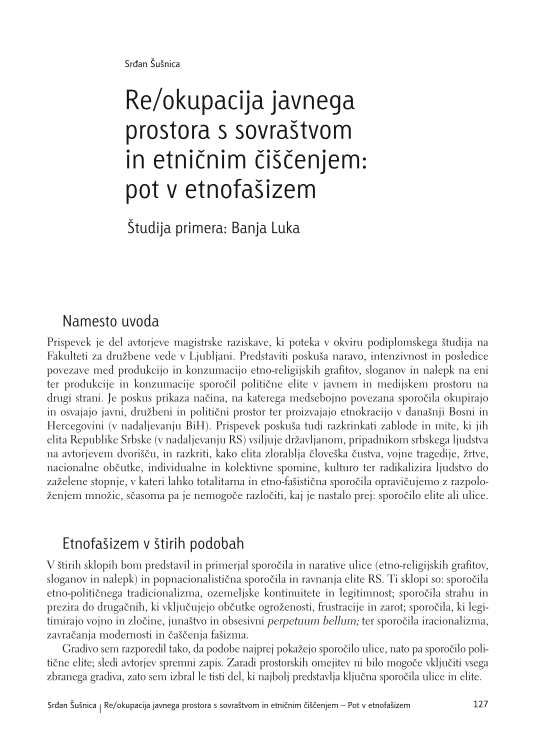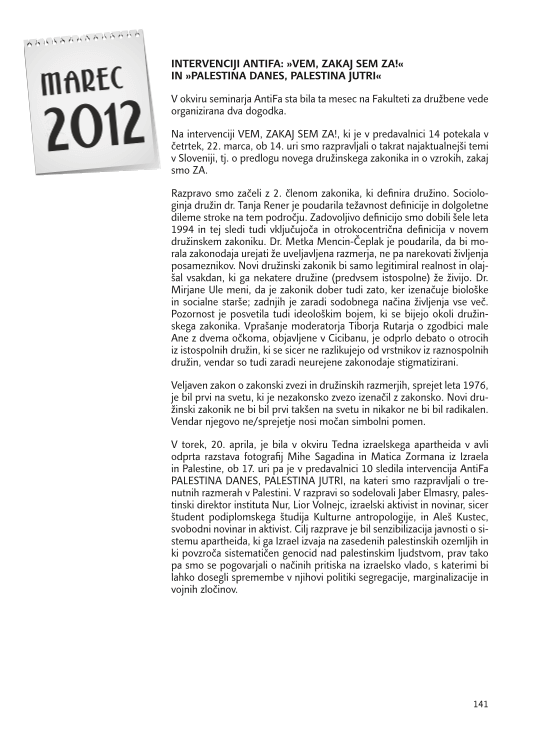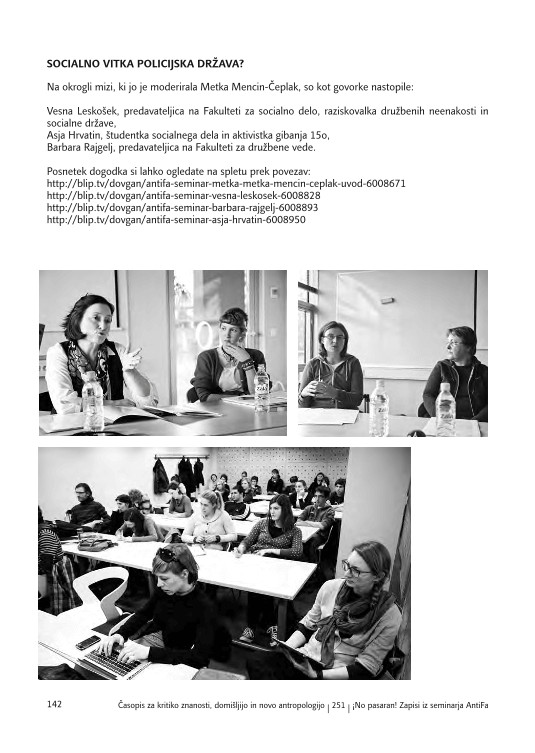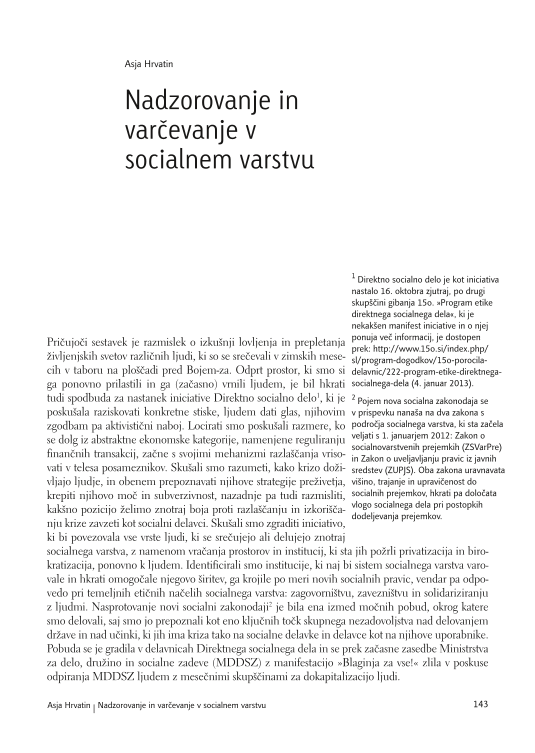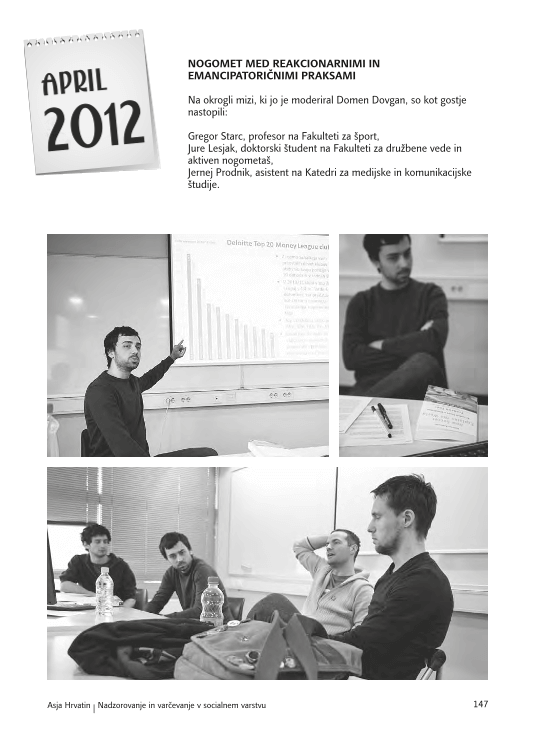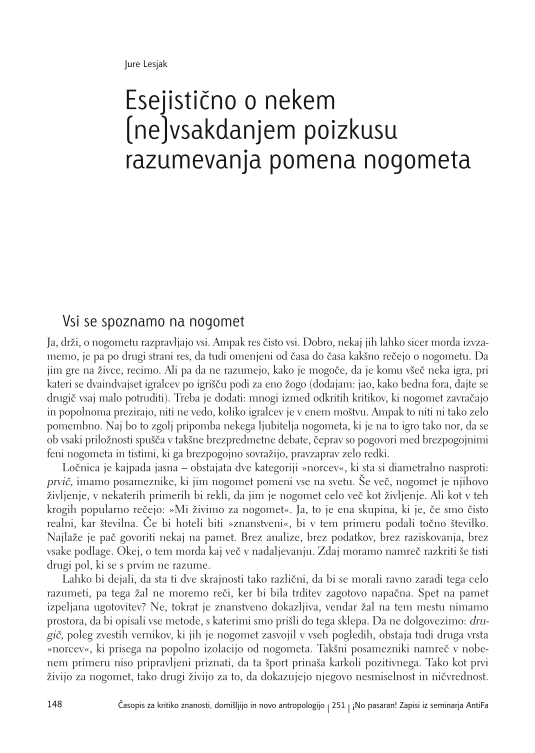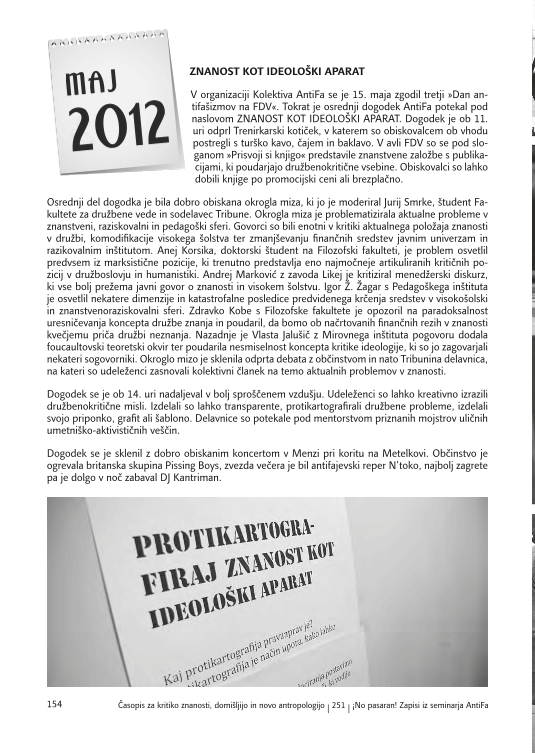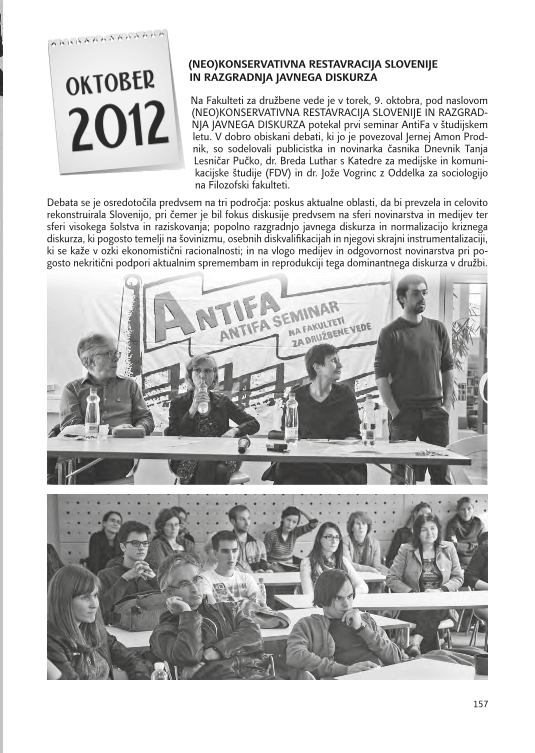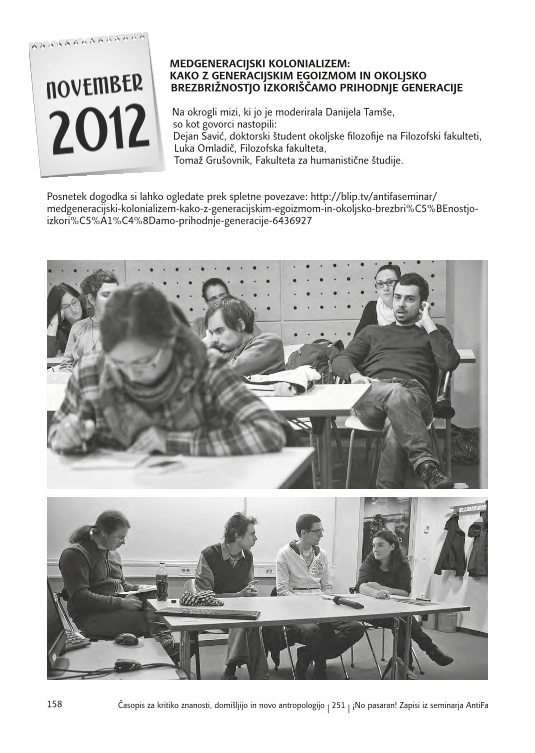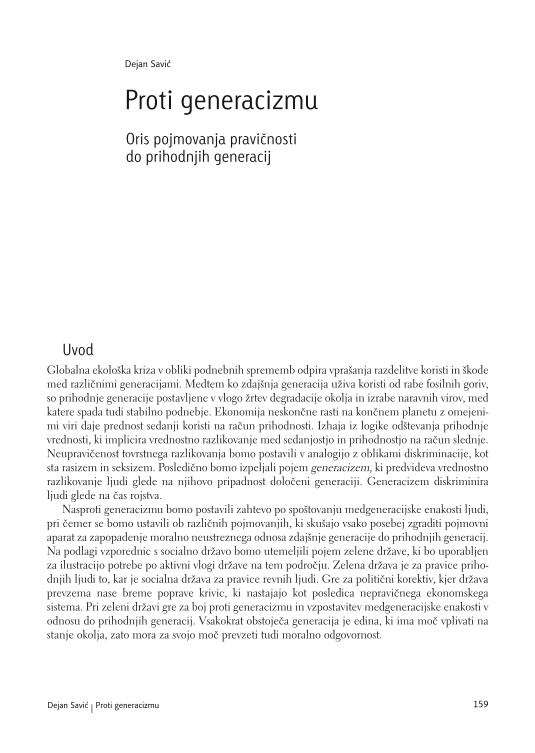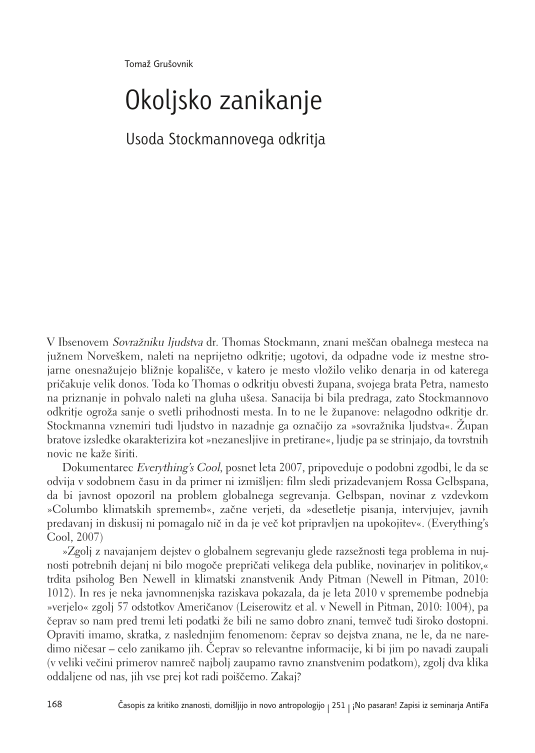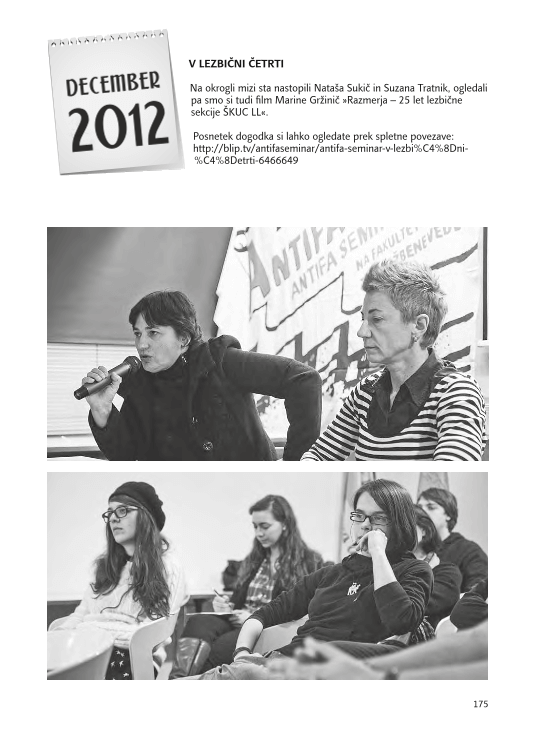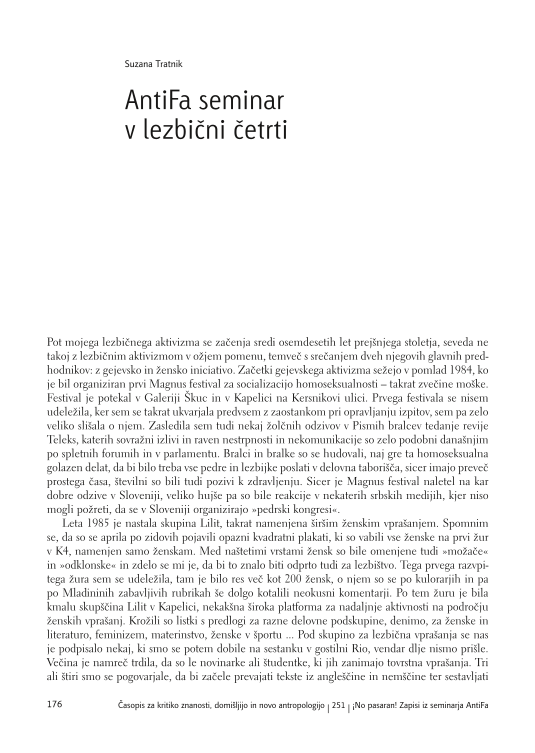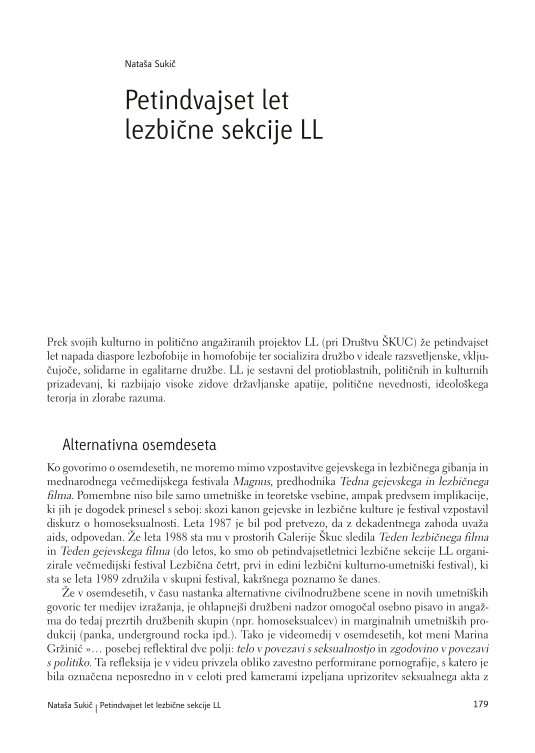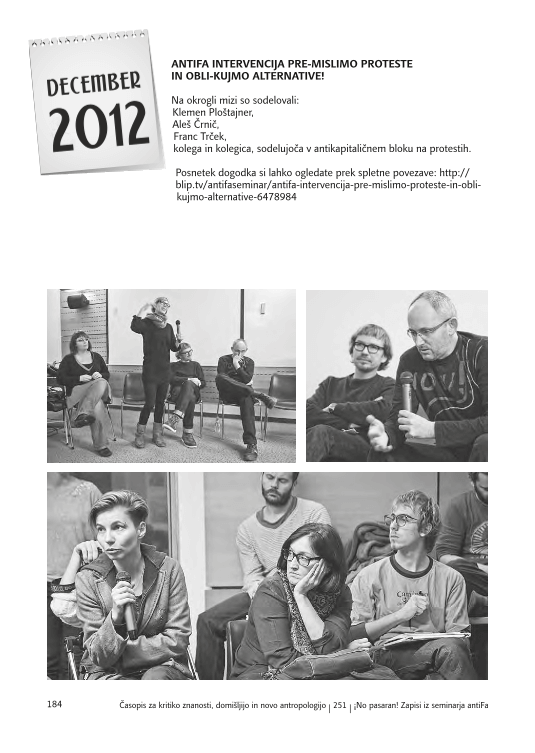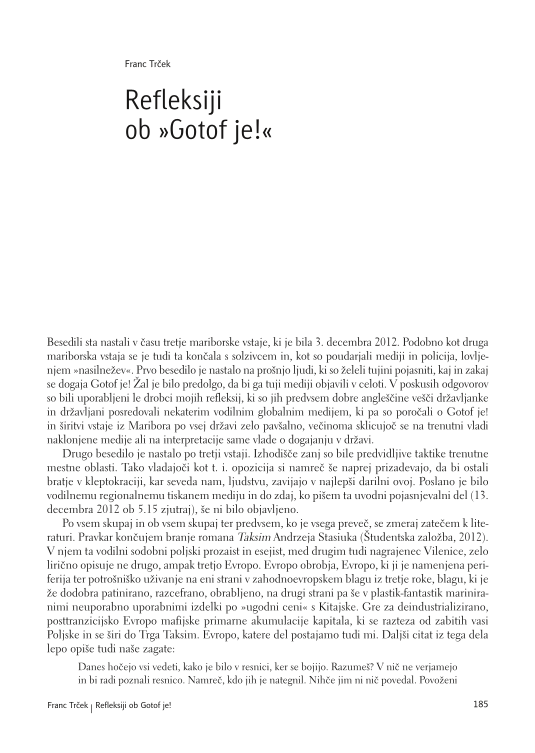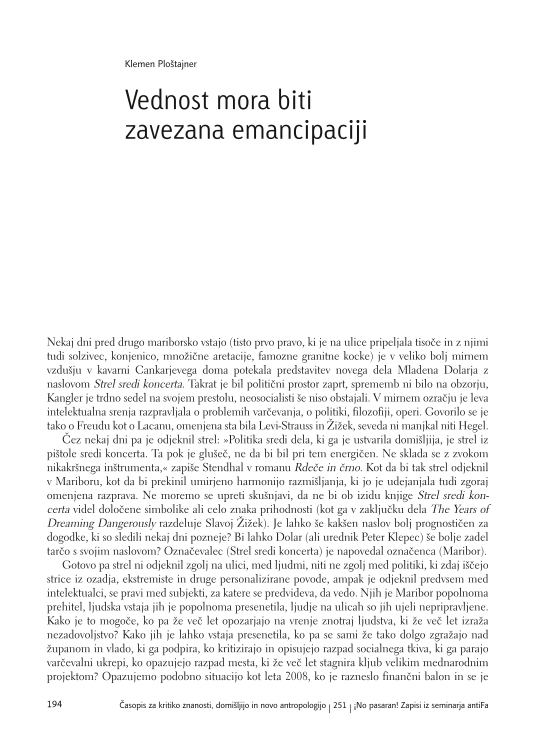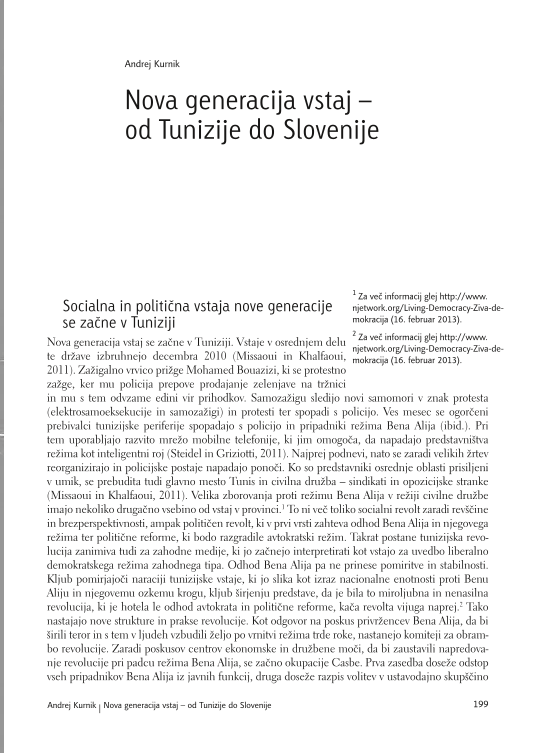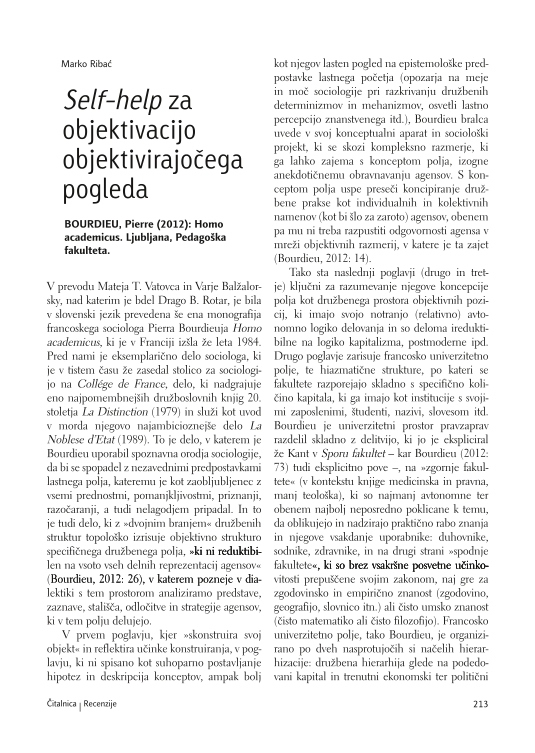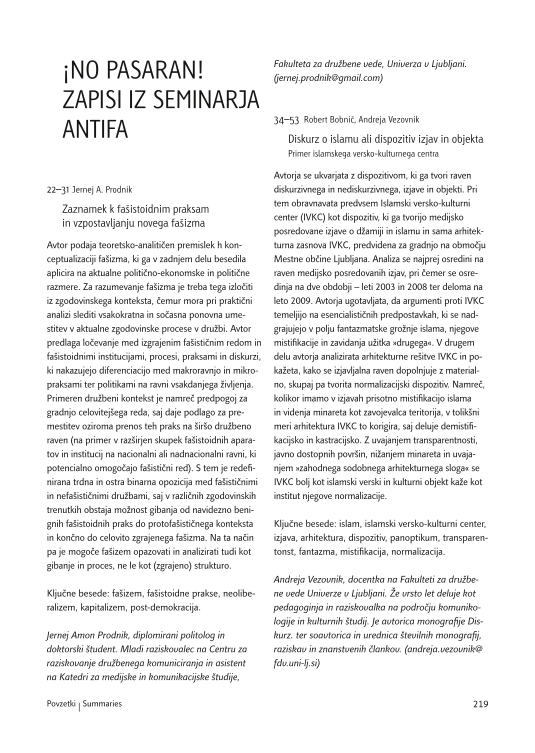Maja bodo minila tri leta od Dneva antifašizmov, kakor smo poimenovali prvi dogodek, ki smo ga pod naslovom Tu je vse živo izvedli na Fakulteti za družbene vede v Ljubljani. Naš prvotni namen je bil opozoriti na porast fašističnih in neonacističnih incidentov na sami fakulteti, vendar je obenem segal zunaj tega ožjega okolja in akademskih zidov, v širšo družbo. V univerzitetni prostor smo zato želeli vnesti problematiziranost sistematične (in sistemske) ravnodušnosti, ki je prevladovala v odnosu do aktualnih manifestacij fašističnih in neonacističnih provokacij. Imeli smo samo dve možnosti: še naprej zatiskati (vsaj eno) oko in se občasno moralistično pridušati na kakšnem hodniku akademskega slonokoščenega stolpa ali pa združiti teorijo s prakso, mišljenje prenesti tudi v delovanje in vzpostaviti resno kritiko sedanjih razmer. Odločili smo se za napornejšo, a tudi bolj zadovoljujočo pot.
Prevladujoči argumenti ravnodušnosti so bili na las podobni argumentom, povezanim z državnim despotizmom v najširšem pomenu besedne zveze: pravzaprav naj ne bi imeli opravka s fašistoidnimi ideologijami in praksami, temveč s sporadičnimi vandalizmi, potenciranim razkazovanjem domoljubja in domoljubnih simbolov ter občasnimi nasilnimi in skrajnimi izpadi, ki so se v takšni ali drugačni obliki manifestirali v fakultetnih in drugih javnih prostorih. Pobuda za resnejši angažma, ki bi omogočal javno upiranje tovrstnim ravnanjem, je torej nastala predvsem z idejo, da je treba spremeniti fakultetno in univerzitetno kulturo ter jo senzibilizirati za bolj kritično, refleksivno in angažirano spopadanje s problemom neofašizma in neonacizma ter drugih večnih fašizmov.
V svojih zgodnjih letih sem dve leti preživel med esesovci, fašisti, republikanci in partizani, ki so streljali drug proti drugemu, in naučil sem se izogibati kroglam. Bila je dobra vaja.
Aprila 1945 so partizani zasedli Milano. Čez dva dni so prišli v malo mesto, v katerem sem takrat živel. To je bil trenutek sreče. Glavni trg je bil poln ljudi, ki so prepevali in mahali z zastavami ter kričali Mimo, Mimo – tako je bilo namreč ime lokalnemu partizanskemu poveljniku. Mimo, nekdanji karabinjerski maresciallo, se je pridružil privržencem generala Badoglia, Mussolinijevega naslednika, in je bil v enem izmed prvih spopadov z ostanki Mussolinijeve vojske ob nogo. Mimo se je torej pojavil na balkonu mestne hiše, bled, opirajoč se na berglo, in z eno roko poskušal pomiriti množico. Čakal sem na njegov govor, kajti vse moje otroštvo je bilo zaznamovano z Mussolinijevimi čudovitimi zgodovinskimi govori, katerih najpomembnejše odlomke smo se v šoli učili na pamet. Tišina. Mimo je spregovoril s hripavim, komaj slišnim glasom. Dejal je: »Meščani, prijatelji. Po tolikih bolečih žrtvah ... nam je uspelo. Slava vsem, ki so padli za svobodo.« In to je bilo vse. Mimo se je vrnil v mestno hišo. Množica je začela spet vzklikati, partizani so dvignili puške in izstrelili častne salve. Otroci smo pohiteli pobirat dragocene naboje, jaz pa sem se povrhu naučil, da pomeni svoboda govora osvoboditev od retorike.
The author provides a theoretical analysis of the concept of fascism, which he then applies to the present politi-cal-economic and political circumstances. He proposes that to understand fascism it is important to separate it from the historical context, while it is at the same time of crucial importance to embed it into the current historical processes in the society. Only this kind of abstraction will enable us to consider fascism in a patently changed, but in many ways similar social context. Furthermore a differentiation is suggested between a completely formed fascist order on the one hand, and fascist institutions, processes, practices and discourses on the other.
This can provide a possible distinction between a macro-level perspective, which focuses on the wider social structures and systems, and micro-practices and micro-politics, which operate at the level of everyday activities. Such differentiation is important because a suitable social context is always a prerequisite for a totally integrated (fascist) order. It is always the social context that helps to transfer fascist micro-practices into the wider and often institutional social level (for example into a broadened complex of fascist apparatuses and institutions on the national or supra-national level that potentially enable the establishment of a fascist order). This also helps us to redefine the hard and sharp opposition between fascist and non-fascist societies: in different historical moments the movement from seemingly benign fascist practices toward a proto-fascist social context and finally to a totally constructed fascist system is always possible. Defined and rethought in this way, fascism can be observed and analyzed as a movement and a process, not only as a (fully constructed and stable, often de-contextualized) structure.
Na prvem dogodku v organizaciji seminarja AntiFa na Fakulteti za družbene vede so kot govorci nastopili:
The article deals with the notion of dispositif, which consists of discursive and non-discursive phenomena, of enouncements and objects. The article shows how the Islamic religious-cultural centre (IVKC) works as a dispositif, formed by enouncements mediated thorugh the public media and the architectural design of the centre to be built in Ljubljana. The first part of the analysis focuses on the level of enouncements transmitted by the Slovenian public media in two time periods – i.e. 2003–2008, and partly in 2009. The authors claim that the arguments against IVKC are grounded in essentialist assumptions and upgraded by the phantasmatic threat of Islam as well as by its mystification. In the second part, the authors focus on the analysis of the architectural solutions of IVKC itself and show how the level of enouncements complements the material/architectural level. Indeed, as much as the enouncements mystify Islam and see the minaret as a conqueror of the Slovenian territory, to the same extent the architecture of IVKC demystifies and castrates. By introducing the notion of transparency and of public areas, by lowering the minaret and incorporating a »modern Western architectural style«, the authors claim that IVKC works less as an Islamic religious and cultural facility and more as a self-normalizing institution.
The article presents a case of »scientific« argument supporting racism in psychology (»Cattell controversy«). The author argues that scientific racism in psychology should not be considered as an excess but rather as a symptom. It is not limited to a few cases of eugenicist and evolutionary psychologists; it is closely tied to the genetic reductionist concept of a person and of psychological differences, and to the role of psychological knowledge in (bio) power relations. It concludes with comments on the social responsibility of scientists and points out that scientific conclusions cannot be detached from their effects.
Na okrogli mizi o ekonomskem fašizmu smo si ogledali dokumetarni film Jelene Aščić Gradimo suženjstvo, kot govorci na okrogli mizi, ki jo je moderirala Marta Gregorčič, pa so nastopili:
Lana Zdravković z Mirovnega inštituta,
Aigul Hakimova in Armin Salihović iz gibanja Nevidni delavci sveta,
Irina Vinčić, podiplomska študentka na Fakulteti za družbene vede.
In the extremely antipolitical time of the turbo-capitalistic way of shaping society, which cosiders that profit is more important than people – and animals, nature, social relations … actually anything – it became obvious that rethinking new concepts of democracy, representation and identitarianism or communitarism, which are presented to us as self-evident, unchangeable/ eternal and final and which not only camouflage that catastrophic situation but also actively support and reproduce it – is needed. What that concept with all its attributes really produces, encourages and preserves is the fear of equality, which paralyses each emancipatory action. The article aims to rethink the possibility of emancipatory politics and consequently to open up the question of alternative ways of shaping society, to be based on solidarity, justice and equality of everyone, and not based on profit, competition and exploitation. To achieve that, the text examines the ways and possibilities of resistance and considers the aims of the protagonists and the places of this resistance as key political issues of our time.
V torek, 2. novembra 2010, je bil na Fakulteti za družbene vede drugi seminar AntiFa v tem študijskem letu in tretji dogodek o sodobnih fašistoidnih praksah ter uporu proti njim. Govorili smo o zgodovinskih povezavah med fašizmom, kolonializmom in imperializmom ter o sodobnih neokolonialnih ter imperialnih praksah. Dogodek smo začeli s posnetkom pogovora z Gašperjem Pleškom, poznavalcem razminiranja in uničevanja odvečnih zalog streliva, ki je bil eden od napovedanih gostov, vendar se dogodka ni uspel udeležiti. V pogovoru je med drugim opozoril na problem glede možnosti za pogojevanje humanitarne in predvsem razvojne pomoči ter tekmovalno naravnanost podjetij, ki se ukvarjajo z razminiranjem in odstranjevanjem orožja, pri čemer je mogoče tudi dobro služiti.
Izhodišče decembrskega seminarja AntiFa na Fakulteti za družbene vede je bil takratni izgon Romov iz Francije. Dogodek je po mnenju nekaterih komentatorjev, pa tudi visokih predstavnikov Evropske unije, spominjal na najtemnejše obdobje preganjanja v času nacizma. Nekateri pa so razlog za množični izgon iskali v poskusih trenutne francoske vlade, da preusmeri pozornost javnosti od korupcijskih škandalov, v katere so bili vpleteni z njo povezani krogi. Predstavnike Evropske unije so pomirila zagotovila predstavnikov Francije, da cilj politike izgonov niso Romi, državljani drugih članic Evropske unije, ampak reveži, ki nimajo zaposlitve in strehe nad glavo, teza o prenašanju pozornosti pa se zdi preveč površna, da bi lahko pripomogla k ustrezni analizi dogodka.
Na okrogli mizi sta nastopila Gal in Bor Kirn.
The author diagnoses the discursive shift in the core of Europe, where the neofascist tendency is not only a matter of the margins. It is not restricted to the cliche of the unemployed working class poor from Eastern Germany, but rather it has migrated into the main political parties. As a symptomatic example of this neofascist turn the author analyzes the bestseller Germany Is Abolishing Itself, the literary and quasi-scientific achievement from Thillo Sarazzin, once a member of the German Federal Bank and still a member of Social Democrats. This recent best-seller made politically incorrect vocabulary on Muslims a legitimate scientific argument. In the light of contemporary neoliberal restructuring of the economic crisis, and the role Germany plays within it, one could start speaking about the rise of »nationalliberalism«.
Na tej intervenciji AntiFa na Fakulteti za družbene vede, ki je potekala v četrtek, 10. februarja, smo govorili o aktualnih dogodkih v arabskem svetu, še posebej v Egiptu. Ena od zahtev arabskih protestnikov je zavrnitev neoliberalnega tržnega modela, v katerega so vpeti skozi postkolonialni režim; zahteva je več kot očitno neposredno povezana z vsemi nami. Razpravo so odprli Primož Šterbenc, Barbara Skubic, Sami Al-Dhagistani in Mirt Komel. Govorci so naredili izčrpen pregled historičnega in geopolitičnega ozadja aktualnih političnih dogodkov, vsak pa je podal tudi svoj pogled in interpretacijo na dogajanje.
FEBRUARY 2011: A Public Forum with a Self-Organized Group of SCT Workers: »We’re Building the Future«
(
Na javni tribuni »Gradimo prihodnost«, ki je v sredo, 2. februarja 2011, potekala na Fakulteti za družbene vede, so samoorganizirani delavci SCT – aktivisti Nevidnih delavcev sveta (IWW) – in aktivisti socialnega centra Rog predstavili stisko, v kateri so se znašli delavci podjetja SCT Obrati v stečaju. Udeleženci tribune so izvedeli, kako črna je prihodnost, ki jo gradijo vodilni v SCT: legalno, pollegalno in nelegalno izigravanje delavcev, taktična uporaba stečaja za izogibanje izplačilu zaostalih plač in odpravnin, lažne obljube in izsiljevanje, ob vsem tem pa še zakonodaja, ki migrantske delavce postavlja v položaj, v katerem nimajo skorajda nikakršne pogajalske moči v odnosu do delodajalcev, in samovoljno ter nelegalno ukrepanje represivnih aparatov države, ki se zanašajo na to, da delavci niso seznanjeni s svojimi pravicami.
MARCH 2011: The 70th Anniversary of the Foundation of the Liberation Front of the Slovenian Nation
(
Na okrogli mizi so poleg moderatorke Mace Jogan nastopili tudi:
In 2011 over 70 years had passed since the foundation of the Liberation Front of the Slovenian Nation which linked the majority of the Slovenian people in defence against the military occupantion during WWII. At present, knowledge about fascism and Nazism, about the cruelties and violent ethnocide carried out by German, Italian and Hungarian occupation troops is very limited, particularly among youth educated after the changes in the political system in Slovenia and the establishment of an independent state (1991). Scant and superficial is also their knowledge on the organized activity of the Liberation Front in the national liberation fight. For this reason the round table »We didn’t submit to their wild power…« was organised as part of the Anti-Fa seminar at the Faculty of Social Sciences (1 March 2011). Its aim was to renew interest in and expand public awareness of the LF, and also to evaluate its programme according to past and present social conditions (including a comparison with resistance movements in other European countries. The discussion was intended to contribute to raising sensitivity to various new forms of fascist or Nazi tendencies. This article outlines the broad circumstances during the last two decades, characterized by the denial and disregard of the LF’s importance on one hand and by the direct or indirect legitimization of collaboration with the occupation forces on the other. This cleavage of the historic memory was also raised in the discussions of the round table. The LF was seen as a unique historic organization and the final assessment of its work was predominantly positive.
Na okrogli mizi, ki jo je moderirala Andreja Vezovnik, so kot govorci nastopili:
In this article I will address the complex relations between linguistic vulnerability as it is understood and construed by Judith Butler, and the freedom of expression in an antagonistic society that was conceptualized by Chantal Mouffe. The purpose of this article is to move away from the dominant moralizing discourse which tackles the emergence of fascistic and hateful discursive practices uncritically and in a politically neutral manner, and then offer an alternative view of the paradox between the freedom of expression and the regulation of hate speech. First, I concentrate on the performative functioning of words that injure and the question of how to subvert this discursive subjection that the hate speaker is seeking to constitute in a way that will enable the critical agency of the one injured. Butler’s post-structuralist view on the performance of discursive acts reveals potential sites and possibilities for critical agency. With her critical analysis of moderate consensus politics, Mouffe identifies the narrowing of the political space for articulation of antagonistic relations in society as the effect of the dominant post-political rationality. At the end I come to the conclusion that generating open discursive spaces is of crucial importance for the facilitation of critical subversion of hateful contents and restoring a state of normality.
Na drugem celodnevnem dogodku v organizaciji seminarja AntiFa na Fakulteti za družbene vede, naslovljenem z ALTERNATIVE, sta bili poleg ostalih aktivnosti izpeljani dve okrogli mizi.
Gostje na prvi okrogli mizi, ki jo je moderiral Sašo Slaček in je bila posvečena alternativam ekonomskemu fašizmu, so bili:
The case of migrant workers in Slovenia is the basis for this article which deals with the question of exclusivity and the hierarchical nature of citizenship. Migrant workers are not seen as passive objects, but as entities that challenge the existing definition of citizenship and demand the expansion of civil rights. Labour migration in Slovenia is defined on the basis of strategic documents governing the so-called secondary labor market, at the same time creating what Etienne Balibar calls real European racism. This has galvanized migrant workers in Slovenia to organize in a movement called Invisible Workers of the World (IWW), which can be seen as a revolt against the current visa regime. With their struggle to expand freedoms and destabilize restrictive migration policies, migrant workers have become an important part of social reality. This article also deals with both the permanent and temporary tools and the methodologies being used by activists of the movement to organize their struggle. The IWW movement itself has become an important autonomous entity whose activity cannot be ignored.
V torek, 4. oktobra 2011, je na Fakulteti za družbene vede potekal prvi seminar AntiFa v novem študijskem letu. Na seminarju smo lahko spoznali delovanje radikalne umetniške zadruge Justseeds, ki skozi svoje stvaritve reflektira radikalne družbene, okoljske in politične teme. Seminar sta s kratkim uvodom odprla Božidar Zrinski in Sandi Abram, ki sta na kratko predstavila zadrugo Justseeds in njenega člana Santiaga Armengoda, ki je v nadaljevanju podrobneje predstavil delovanje zadruge, njihov način ustvarjanja ter njihove cilje.
NOVEMBER 2011: Boj za: Discomfort With Homosexuality and How Far (to the Left) Does it Go?
(
V torek, 8. novembra 2011, je pred Boj za potekal drugi AntiFa seminar v študijskem letu. Številno občinstvo je z govorci aktivno razpravljalo o tem, »Kako daleč (na levico) seže nelagodje s homoseksualnostjo?« Tokrat se kritika ni osredotočila na skrajne konservativne in militantne homofobne argumente, ki prežemajo slovenski javni prostor. Nasprotno, razprava se je dotaknila veliko bolj spolzkega terena, ambivalentnih argumentov in problematičnosti delovanja načelnih podpornikov pravic istospolno usmerjenih.
V torek, 6. decembra 2011, je potekal tretji seminar AntiFa v znamenju anarhističnega gibanja. V predavalnici 10 je potekala delavnica z naslovom ANARHIZEM KOT METODA ORGANIZIRANJA, ki sta jo vodila aktivista Tine in Matevž. Udeleženci so aktivno sodelovali pri nalogi iskanja definicije anarhizma in tako odpirali številna vprašanja, povezana z anarhizmom.
Govorca na dogodku sta bila Mitja Velikonja in Srđan Šušnica.
The Continuation of Politics by Other Means: Neo-Fascist Graffiti and Street Art in Slovenia
(
This article analyses graffiti and street-art production by extreme right-wing groups in Slovenia. Classification of the main topics and identification of groups of authors is followed by a critical analysis. This production can be understood along the line of modern–postmodern fascism. Modern fascism is direct, exclusive, aggressive, while the postmodern one is even more dangerous, because it looks inclusive, conciliatory, and its language seems integrative. However, their final goal is identical: hierarchical, authoritarian, ethnically and culturally homogenous and corporative society. The basic finding of the study is that hate-speech on the walls and the policies of dominant institutions are basically the same, so we can speak about the continuation of the same politics by other means. Everything that is written in the graffiti has already been said from the pulpits of dominant politics. Finally, examples of »decontamination« of public spaces are listed, i.e. removal of extremist graffiti and street art or their creative subversion.
The article analyses the symbolism and the meaning of ethno-religious graffiti, slogans and stickers especially as they are used on the streets of Banja Luka. The city used to be a strategic centre for armed forces but is today the political centre of Republika Srpska (RS), supposedly a legitimate military conquest of the people of Serbia. Responses in ethno-religious graffiti can be turbulent. In our case, narrative and visual codes transmit dominant messages and myths of the Serbian ethnical corpus which can easily become hate speech, especially in the post-war context, in which ethno-religious differences are being brought to the fore, war crimes and armed victories are being exalted and expressions of non-tolerance are common. This aggressive visibility of »ours« pushes all the rest and anyone who is different into invisibility and self-censoring. The article researches characteristics and the quality of connection between the production and the results of ethno-fascistic speech in graffiti and in the messages of the RS ethno-political elites in public forums, regulations and media spaces. A contextual interpretation of a graffiti discourse, which was formed in the midst of civil war, ethnic cleansing, attacks on and the separation of Bosnia and Herzegovina and activities of political elites in RS, is offered. The intimate connection between street discourse and that of political elites shows that a populist legitimization of the activities of the RS is still a political goal that also triggers the process of forgetting the region’s multi-ethnic past. In Banja Luka, this process offers a »national and spiritual« legitimacy for the existence of RS and seeks to make the city a part of the Serbian ethnic community. It offers an unconvincing cultural-political and war-emancipatory »continuity« and »normality« for the RS and covers up its real intention of bloodshed from which it had emerged. In this it is consistent with Eco’s notion of Ur-Fascism.
MARCH 2012: AntiFa Interventions: »I know what I stand for!« and »Palestine Today, Palestine Tomorrow«.
(
V okviru seminarja AntiFa sta bila ta mesec na Fakulteti za družbene vede organizirana dva dogodka.
Na intervenciji VEM, ZAKAJ SEM ZA!, ki je v predavalnici 14 potekala v četrtek, 22. marca, ob 14. uri smo razpravljali o takrat najaktualnejši temi v Sloveniji, tj. o predlogu novega družinskega zakonika in o vzrokih, zakaj smo ZA.
Na okrogli mizi, ki jo je moderirala Metka Mencin-Čeplak, so kot govorke nastopile:
One of the manifestations of the global crisis of financial capitalism and the policies arising from it was the imposition of austerity measures, which not only resulted in privatization of the commons and general expropriation of the people, but also managed to introduce new mechanisms of discipline and punishment. Debt, being the fundament of relations in society, forced itself into the system of social security: new legislation, regulating welfare benefits, has now shifted to a method for the criminalization of poverty, deepening class differences and transforming social workers (and the system of social security as a whole) into a moralizing, bureaucratic machine for disciplining the population. The new legislation also shows a lack of reflection on the changes that need to be made to the welfare state in order to create social services that meet the needs and desires of individuals. Instead of improvements that provide decent living conditions and a new system of social rights (to deal with the problems resulting from precarious working conditions), people are faced with depersonalization, humiliation and increased hate speech and other fascist practices.
The effect of austerity measures on the social security system does not end with the devastation of service users’ lives and their communities, which are slowly becoming exhausted, individualized and devoid of solidarity. It also means a big step backwards for the core ethics and principles of social work. Social workers are increasingly alienated from their clients and the communities they live in. They function more in the service of the government and its policies rather than as advocates of people’s rights.
Na okrogli mizi, ki jo je moderiral Domen Dovgan, so kot gostje nastopili:
In the introduction the author presents some reflections, interpretations and misconceptions about football. The main emphasis is on the irrelevant contextualization(s). Two key questions are highlighted: on the one hand, the connection between football and its installation into the vast social and political context – because of its global dimensions football can be viewed as an important structural component in the global capitalist system. On the other hand, the article tries to draw the (perilous) distinction between the understanding of »football« (in its broadest definition) and »the game of football« (concerning its philosophy and complexity). From that point of view the author focuses on a certain aspect in the game of football where relations between players are based on relatively equal roles – this concept is the origin of representing the idea and potential of different forms of association and integration between individuals, collectives and communities.
V organizaciji Kolektiva AntiFa se je 15. maja zgodil tretji »Dan antifašizmov na FDV«. Tokrat je osrednji dogodek AntiFa potekal pod naslovom ZNANOST KOT IDEOLOŠKI APARAT. Dogodek je ob 11. uri odprl Trenirkarski kotiček, v katerem so obiskovalcem ob vhodu postregli s turško kavo, čajem in baklavo. V avli FDV so se pod sloganom »Prisvoji si knjigo« predstavile znanstvene založbe s publikacijami, ki poudarjajo družbenokritične vsebine. Obiskovalci so lahko dobili knjige po promocijski ceni ali brezplačno.
OCTOBER 2012: The (Neo)-Conservative Restoration of Slovenia and the Disintegration of Public Discourse
(
Na Fakulteti za družbene vede je v torek, 9. oktobra, pod naslovom (NEO)KONSERVATIVNA RESTAVRACIJA SLOVENIJE IN RAZGRADNJA JAVNEGA DISKURZA potekal prvi seminar AntiFa v študijskem letu. V dobro obiskani debati, ki jo je povezoval Jernej Amon Prodnik, so sodelovali publicistka in novinarka časnika Dnevnik Tanja Lesničar Pučko, dr. Breda Luthar s Katedre za medijske in komunikacijske študije (FDV) in dr. Jože Vogrinc z Oddelka za sociologijo na Filozofski fakulteti.
Na okrogli mizi, ki jo je moderirala Danijela Tamše, so kot govorci nastopili: Dejan Savić, doktorski študent okoljske filozofije na Filozofski fakulteti, Luka Omladič, Filozofska fakulteta, Tomaž Grušovnik, Fakulteta za humanistične študije.
Humanity faces a global ecological crisis in the context of climate change which challenges established forms of political thought and action. The discussion of justice is applied to the future, where we understand time and the natural environment as a common bond between people from different periods. We put today’s generation in a relationship with the generations in the near and more distant future. The term »generacism«, describing the current way of thinking as another form of discrimination, allows us to show the inadequacy of our attitudes towards future generations. By destroying the global environment, we create injustice towards future generations on the basis of the time of peoples’ birth. In this context, time is understood as an arbitrary circumstance, which does not suffice as a basis for discriminating between people. We defend the concept of intergenerational justice that gives the state the responsibility for implementing environmental protection measures in order to protect future generations and eliminate generacism from our society and economy. We propose the so-called green state, which bases environmental protection measures on fairness to future generations.
Even though today reliable information about the negative impact of humans on the environment is only two clicks away, a considerable number of people still deny it. Why? Research shows that what we might call ’environmental denial' is a consequence of specific social and psychological factors: if we were to admit the negative impact of our lifestyles on the environment, we would have to change our way of life founded on consumerism. However, consumerism is not simply a way of exchanging goods; it is also something around which we organize the meaning of our lives, as consumer research clearly shows. Therefore we deny the information on the negattive impact of human activity on the environment because admitting it would lead to a conflict between cognition (attitudes, beliefs) and actions (behaviour) around which we organize the meaning of our lives. Such an exposition points to wider sociopolitical effects. Firstly, it raises questions about education that have to take into account the non-rational nature of human beings, and secondly it raises questions about the directions and possible outcomes of social action.
Na okrogli mizi sta nastopili Nataša Sukič in Suzana Tratnik, ogledali pa smo si tudi film Marine Gržinič »Razmerja – 25 let lezbičnesekcije ŠKUC LL«.
The author interlaces a personal activist history and the rise of gay, feminist and finally lesbian initiatives in the 80s in Ljubljana. Influenced by the experiences of the international lesbian movement and the particular lesbian situation in the context of socialist Yugoslavia, the Slovenian lesbian movement itself often wavered between its natural allies: feminists and gays. Finally it attained independence as a Lesbian group LL within the ŠKUC Association, and the group now runs the lesbian Monokel club in the Metelkova squat. Since its beginning in 1987, it has developed a rich infrastructure of programs, activities and spaces.
Author describes the beginnings and the history of Škuc LL, the first activist lesbian group in Eastern Europe and former Yugoslavia. Trough projects within the cultural and political domains the group has been fighting against lesbophobia and homophobia for the last 25 years.
The group tries to create an inclusive, united and egalitarian society of enlightment ideals. The author mixes personal activist history with a development of a lesbian movement from the first initiative in the alternative society of the 80s in Ljubljana to the situation today.
Na okrogli mizi so sodelovali: Klemen Ploštajner, Aleš Črnič, Franc Trček, kolega in kolegica, sodelujoča v antikapitaličnem bloku na protestih.
This article combines two texts, which were written at the time of the third Maribor uprising in 2012. The first explains to an imaginary foreigner, why Gotof je! happened. In doing so, I start from the concept of primary accumulation of capital, which is typical for most of the transitions in Eastern European countries, and the failure of reform of local government in Slovenia, the consequence of which is local sheriffs. The second text is trying – through the analysis of actual political events in the city and municipality – to answer the question of what kind of election we need in Maribor. Both texts are a real-time analysis of the theory in practice. I call such attempts »weak theory« because the practice course ahead. I see this as a big advantage of weak theory, not as a weakness, because it not generalises where it is not possible.
The article considers the place of knowledge and the role of intellectuals in contemporary knowledge society in which knowledge is more and more subsumed under the logic of production and commodities. Subjects are supposed to know and their products (knowledge) are thus completely immersed in mechanisms of domination, which is practised more and more in the name of rational, technical, objective laws of capitalist production. The protest movement in Slovenia rejects the traditional status of intellectuals, forcing them to wake up and start using their knowledge as a tool of emancipation. If fascism represents a failure of revolution to achieve emancipation, then intellectuals have the task to prevent the march of fascism.
The uprising in Tunisia, the occupation of public squares in Spain, the Occupy Wall Street movement, the global uprising on 15 October 2011 and the recent widespread demonstrations in Slovenia can be understood as the new generation of uprisings following the eruption of financial crisis. Those multitudinal expressions of indignation and quests for real democracy are expressions of the irreversible crisis of neoliberalism and representative democracy. From an examination of the defining traits of uprisings from Tunisia to Slovenia, one can define basic theoretical and practical dilemmas in the new ways of doing political encounters. These include the relationship between the social and political dimensions of uprisings, the relationship between heterogeneity and forms of political organization, how resistance against financialization prefigures emerging forms of direct democracy, how emerging movements address the issue of direct democracy and minority rights, and what theoretical practices can prevent the attenuation of the discourse of uprisings and enable the free production of enunciations.
BOURDIEU, Pierre (2012): Homo academicus. Ljubljana, Pedagoška fakulteta.
V prevodu Mateja T. Vatovca in Varje Balžalorsky, nad katerim je bdel Drago B. Rotar, je bila v slovenski jezik prevedena še ena monografija francoskega sociologa Pierra Bourdieuja Homo academicus, ki je v Franciji izšla že leta 1984. Pred nami je eksemplarično delo sociologa, ki je v tistem času že zasedal stolico za sociologijo na Collége de France, delo, ki nadgrajuje eno najpomembnejših družboslovnih knjig 20. stoletja La Distinction (1979) in služi kot uvod v morda njegovo najambicioznejše delo La Noblese d’Etat (1989). To je delo, v katerem je Bourdieu uporabil spoznavna orodja sociologije, da bi se spopadel z nezavednimi predpostavkami lastnega polja, kateremu je kot zaobljubljenec z vsemi prednostmi, pomanjkljivostmi, priznanji, razočaranji, a tudi nelagodjem pripadal. In to je tudi delo, ki z »dvojnim branjem« družbenih struktur topološko izrisuje objektivno strukturo specifičnega družbenega polja, » ki ni reduktibilen na vsoto vseh delnih reprezentacij agensov« (Bourdieu, 2012: 26), v katerem pozneje v dia-ialektiki s tem prostorom analiziramo predstave, zaznave, stališča, odločitve in strategije agensov, ki v tem polju delujejo.




